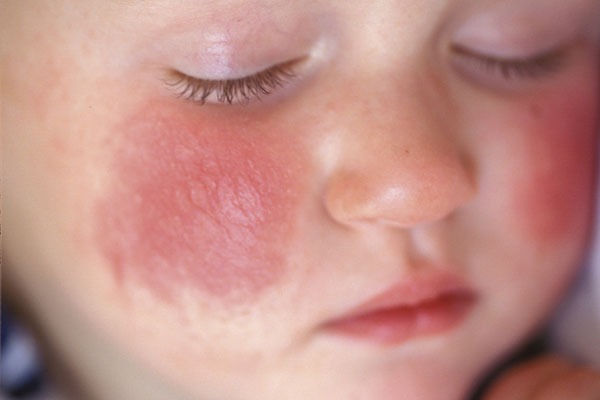Because children's digestive systems are still weak, food allergies are inevitable, of which cow's milk protein allergy is quite common.
Because children's digestive systems are still weak, food allergies are inevitable, of which cow's milk protein allergy is quite common.
Female child NTKA (13 months old, Hanoi ) came to Medlatec Tay Ho General Clinic for examination with red rash on the face, around the mouth, swollen lips, and vomiting milk after drinking 120ml of formula milk.
 |
| To limit milk allergies, mothers should breastfeed their babies exclusively for the first 6 months and can continue until 24 months. Illustration photo |
Through medical history, the child's family said that at about 3 months old, the child was fed formula milk for one meal. While feeding, the child developed a rash around the mouth, so they stopped feeding the baby, and the rash later disappeared. After that, the child did not eat formula milk again and was exclusively breastfed for the first 6 months.
At about 10 months old, the baby's mother gave him formula milk again (about 90ml), and the rash on the mouth and lips and vomiting reappeared.
In previous allergic reactions, the family stopped using formula milk without seeking medical attention. Only when the allergic reaction continued at 13 months of age and the family became concerned about the child's health did they take the child for a check-up.
After clinical examination and history taking, the doctor prescribes paraclinical techniques to confirm the diagnosis. In particular, the allergy panel test gives positive results for cow's milk components (beta-lactoglobulin, bovine serum albumin). The diagnosis is confirmed, the child has a cow's milk protein allergy.
After determining the exact cause of the allergy, the doctor will give the family recommendations on changing the diet as well as notes on child care.
Cow's milk and products derived from cow's milk contain many nutrients that are beneficial to children's health. However, the baby's immune system can react to the protein in this food, leading to allergies.
Cow's milk protein allergy is the most common food allergy in children. The body may have an allergic reaction within minutes to hours after drinking milk or milk products. Some breastfed babies are still susceptible to cow's milk protein allergy. The cause is the mother's use of cow's products, which are passed through breast milk.
An allergy is an overreaction of the immune system when exposed to an allergen. When a child drinks cow's milk, the immune system in the child's body thinks that the protein components in cow's milk are harmful, causing the body to automatically produce immune antibodies (IgE).
On subsequent exposure to cow's milk proteins, the IgE antibodies in the child's body recognize them and alert the immune system, leading to a series of allergic symptoms.
Depending on the allergic condition, the child's body has different levels of reaction. In which, rapid reactions often occur within a few minutes to two hours after drinking milk or eating dairy products.
These reactions can manifest in the skin (hives, swollen lips, swollen eyelids...), throat (hoarseness, difficulty swallowing...), respiratory tract (sneezing, wheezing, difficulty breathing), digestive tract (vomiting, abdominal pain, diarrhea...). Severe cases can lead to anaphylactic shock which is life-threatening if not treated promptly.
Anaphylactic shock can affect the immune system, respiratory system, skin, circulation, digestive system, central nervous system... causing cardiogenic shock, heart failure, and death in a short time.
MSc. Ngo Thi Cam, Pediatrics specialist, Medlatec Healthcare System said that to limit milk allergies, mothers should breastfeed their children exclusively for the first 6 months and can continue until 24 months.
In addition, parents need to pay attention to important information such as in case the child has to use formula milk, parents should pay attention to let the child practice drinking milk in small amounts. If it is safe, parents can adjust to increase the amount of drinking in the next times.
Never arbitrarily replace cow's milk with goat's milk, sheep's milk or soy milk because they can cause cross-allergy with cow's protein.
Consider whether your child has this condition with heat-treated dairy products. There are cases where children are allergic to all dairy products such as yogurt, cheese, biscuits, etc.
Choose the right milk to avoid allergies in your baby such as partially hydrolyzed milk, completely hydrolyzed milk, or amino acid milk.
It is important that parents promptly take their children to reputable medical facilities to specifically identify the type of allergen causing the allergy and its properties, thereby having an appropriate and effective treatment plan.
Source: https://baodautu.vn/canh-bao-tinh-trang-di-ung-dam-sua-bo-o-tre-d237886.html

























![[Photo] National Assembly Chairman Tran Thanh Man visits Vietnamese Heroic Mother Ta Thi Tran](https://vphoto.vietnam.vn/thumb/1200x675/vietnam/resource/IMAGE/2025/7/20/765c0bd057dd44ad83ab89fe0255b783)








































































Comment (0)